Slovakia threatens to cut benefit for Ukrainian refugees in gas dispute
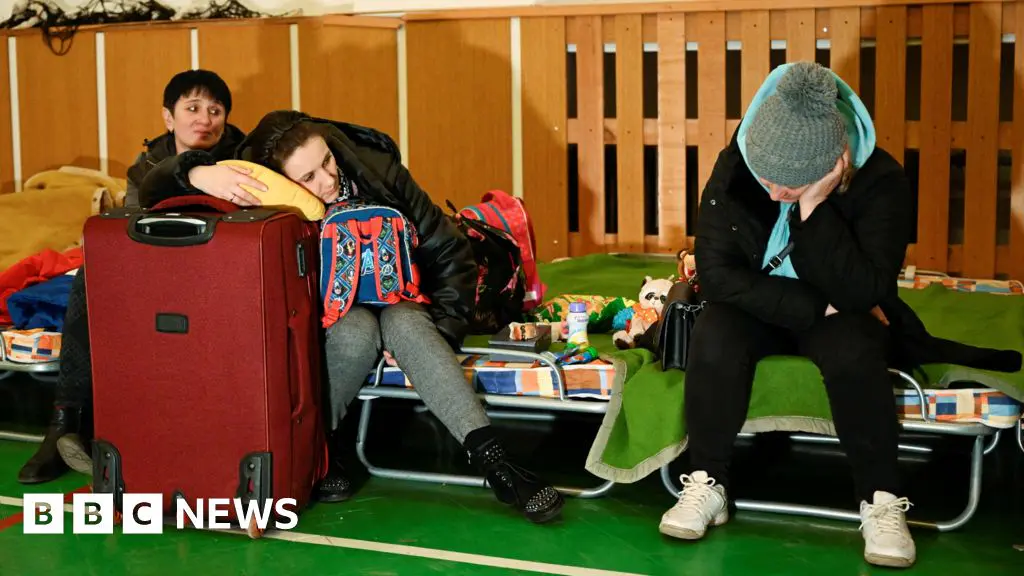
Slovakia's Prime Minister Robert Fico has threatened to cut financial support for more than 130,000 Ukrainian refugees as a dispute with Ukraine over Russian gas supplies escalates.
On 1 January, Kyiv shut off a pipeline that for decades was used to supply Central Europe with Russian natural gas.
Slovakia had been the main entry point and the country now stands to lose millions of euros in transit fees.
The UN's refugee agency (UNHCR) estimated last month that there were 130,530 Ukrainian refugees in Slovakia out of 6,813,900 globally.
Fico - who in December made a surprise visit to Moscow for talks with Russia's President Vladimir Putin - described Kyiv's move as "sabotage".
The prime minister of the EU state said he would propose halting electricity exports to Ukraine and also "sharply reducing" financial support for Ukrainians who have found shelter in Slovakia.
He said there was no risk of Slovakia itself suffering from gas shortages, as it had already made alternative arrangements.
But Fico added that Ukrainian President Volodymyr Zelensky's decision to turn off the taps would deprive Slovakia of 500m euros (£415m; $518m) in transit fees from other countries.
He said his party was ready to debate "halting supplies of electricity" and the "significant lowering of support for Ukrainian citizens in Slovakia".
"The only alternative for a sovereign Slovakia is renewal of transit or demanding compensation mechanisms that will replace the loss in public finances," he added.
Last month Zelensky accused Fico of helping Putin to "fund the war and weaken Ukraine".
"Fico is dragging Slovakia into Russia's attempts to cause more suffering for Ukrainians," the Ukrainian president had said.
Poland has offered to support Kyiv in case Slovakia cuts off its electricity exports - supplies that are crucial to Ukraine, whose power plants come under regular attack from Russia.
Poland's government called Ukraine's shutdown of Russian gas supplies "another victory" against Moscow while the European Commission said the EU had prepared for the change and most states could cope.
Moldova, which is not in the EU, is already suffering shortages.
Russia can still send gas to Hungary, Turkey and Serbia through the TurkStream pipeline across the Black Sea.
Ukraine stops transit of Russian gas to EU in end of era
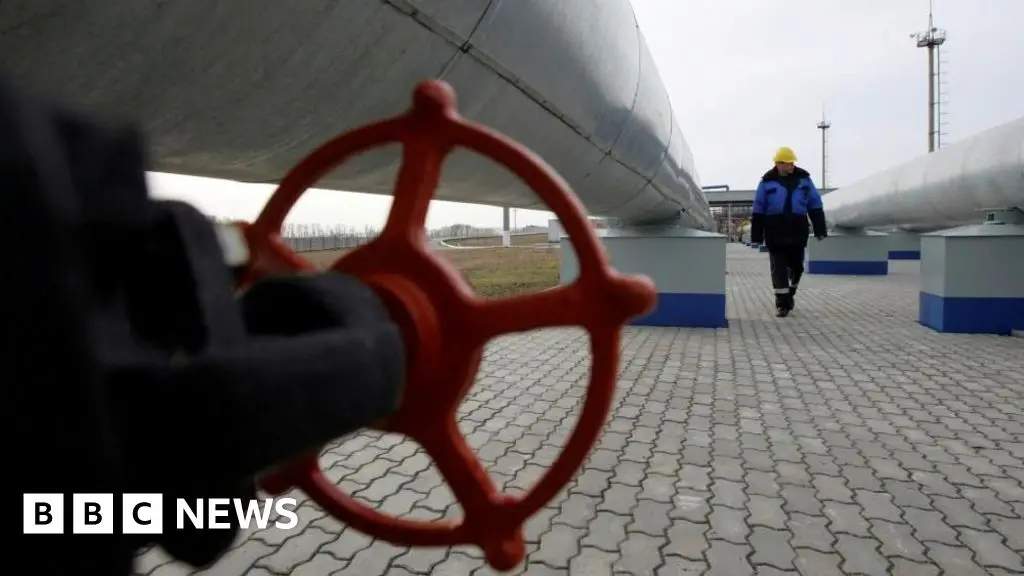
Russian gas has stopped flowing to EU states via Ukraine after a five-year deal expired, marking the end of a decades-long arrangement.
Ukrainian President Volodymyr Zelensky said that his country would not allow Russia to "earn additional billions on our blood". Poland's government meanwhile said the cut-off was "another victory" against Moscow.
The European Commission said the EU had prepared for the change and most states could cope. Moldova, which is not in the EU, is already suffering shortages.
Russia can still send gas to Hungary, Turkey and Serbia through the TurkStream pipeline across the Black Sea.
Russian company Gazprom confirmed that gas exports via Ukraine to Europe stopped from 08:00 local time (05:00 GMT) on Wednesday.
Moscow has transported gas to Europe through Ukraine since 1991.
While immediate effects are light, the strategic and symbolic impact for the whole of Europe is enormous.
Russia has lost an important market, but its president, Vladimir Putin, says EU countries will suffer most.
The EU has significantly reduced imports of gas from Russia since it launched its full-scale invasion of Ukraine in 2022, but a number of eastern member states still depend largely on the supplies, making Russia about €5bn ($5.2bn; £4.2bn) a year.
Russian gas was less than 10% of the EU's gas imports in 2023, according to the bloc. That figure was 40% in 2021.
But several EU members, including Slovakia and Austria, continued to import significant amounts of gas from Russia.
Austria's energy regulator said that it did not forecast any disruption as it had diversified sources and built up reserves.
But the end of the transit deal has already caused serious tensions with Slovakia, which is now the main entry point of Russian gas into the EU and earned transit fees from piping the gas on to Austria, Hungary and Italy.
Slovakia has said it will pay more for alternative routes. Its energy regulator announced in early December that Gas prices for consumers would rise in 2025.
Robert Fico, Slovakia's prime minister, said on Wednesday that the end of the deal would have "drastic" consequences for EU countries, but not on Russia, Reuters reported.
On Friday, Fico - who had just made a surprise visit to Moscow for talks with Putin - threatened to stop supplying electricity to Ukraine.
This prompted Zelensky to accuse Fico of helping Putin "fund the war and weaken Ukraine".
"Fico is dragging Slovakia into Russia's attempts to cause more suffering for Ukrainians," the Ukrainian president said.
Poland has offered to support Kyiv in case Slovakia cuts off its electricity exports - supplies that are crucial to Ukraine, whose power plants come under regular attack from Russia.
Polish foreign minister Radoslaw Sikorski told BBC Radio 4's Today programme there were alternative gas supply routes from international markets, such as a terminal in Croatia and connections from Germany and Poland.
"These routes should be explored so that Russia doesn't make money on selling oil and gas to the European Union," Sikorski said.
Poland is importing gas from the US, Qatar and the North Sea, he added.
"As far as I understand, all countries have alternative routes," he said.
Moldova - which is not part of the EU - could be seriously affected by the end of the transit agreement. It generates much of its electricity at a power station fuelled by Russian gas.
It also supplied the Russia-backed breakaway region of Transnistria, a small sliver of land sandwiched between Moldova and Ukraine where around 300,000 people live.
Russian gas company Gazprom had said on 28 December it would restrict gas to Moldova on 1 January because it said it had failed to fulfil its payment obligations.
Dorin Recean, Moldova's prime minister, denied the alleged debt and accused Russia of using "energy as a political weapon" in a social media post. He said the move would leave Transnistria "without light and heat in the middle of the winter".
Heat and hot water was cut off to Transnistria "due to the temporary cessation of gas supplies" at 07:00 local time (05:00 GMT) on Wednesday, energy company Tirasteploenergo said on Telegram.
It urged residents to dress warmly, gather family members together in a single room, hang blankets or thick curtains over windows, and use electric heaters.
The temperature was due to drop below 0C on Wednesday night. Medical institutions and hospitals were still being supplied, the company said.
Moldova's energy minister, Constantin Borosan, said his government had taken steps to ensure stable power supplies, but called on citizens to save energy.
A 60-day state of emergency in the energy sector has been in place since mid-December.
President Maia Sandu accused the Kremlin of "blackmail" possibly aimed at destabilising her country before a general election in 2025. The Moldovan government also said it had offered aid to Transnistria.
The EU has found alternative sources in liquefied natural gas (LNG) from Qatar and the US, as well as piped gas from Norway, since Russia's invasion of Ukraine.
In December, the European Commission laid out plans to entirely replace gas transiting through Ukraine.
Russian gas era in Europe ends as Ukraine stops transit
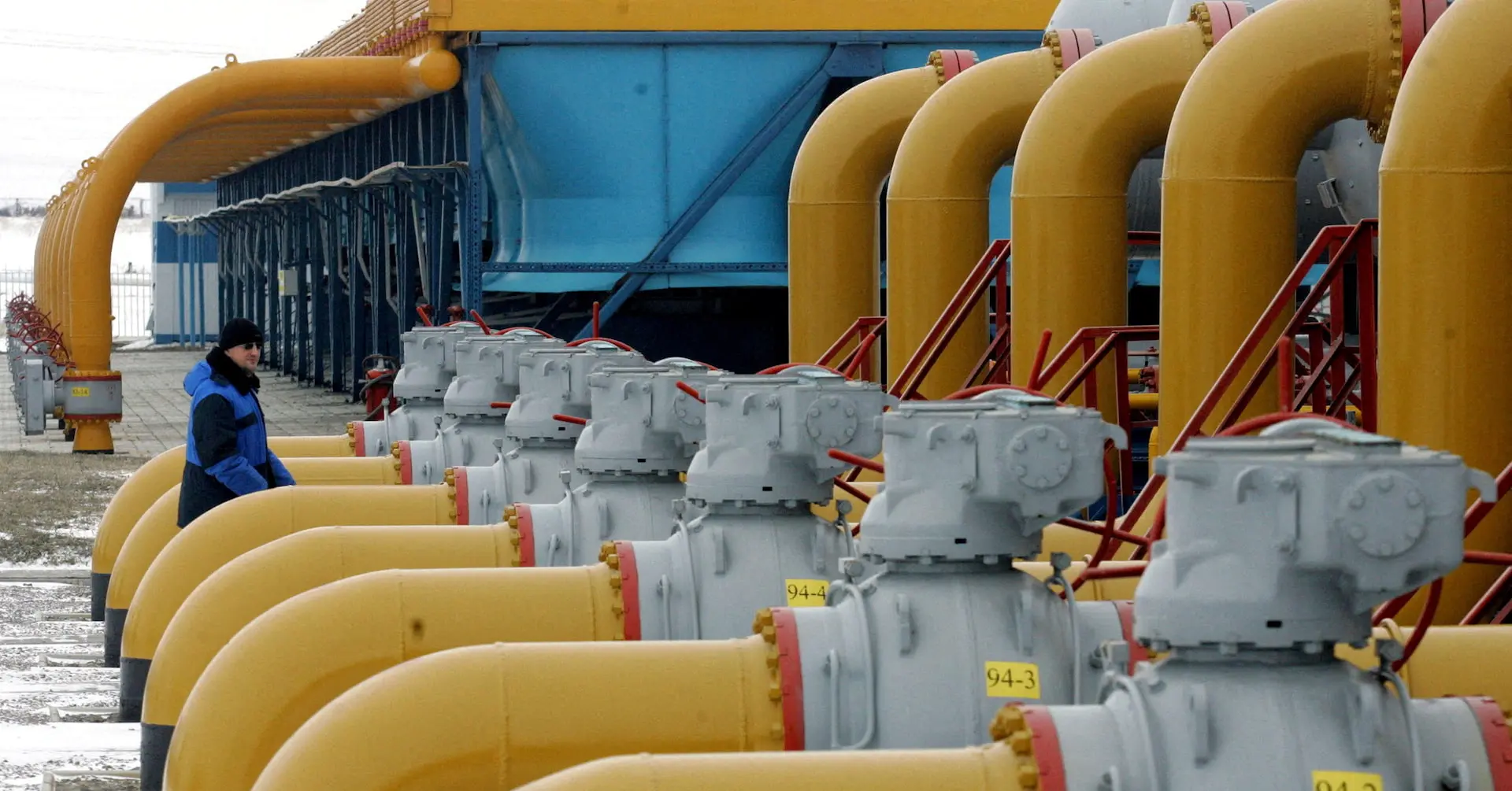
MOSCOW/KYIV, Jan 1 (Reuters) - Russian gas exports via Soviet-era pipelines running through Ukraine came to a halt on New Year's Day, marking the end of decades of Moscow's dominance over Europe's energy markets.
The gas had kept flowing despite nearly three years of war, but Russia's gas firm Gazprom said it had stopped at 0500 GMT after Ukraine refused to renew a transit agreement.
The widely expected stoppage will not impact prices for consumers in the European Union - unlike in 2022, when falling supplies from Russia sent prices to record highs, worsened a cost-of-living crisis and hit the bloc's competitiveness.
The last remaining EU buyers of Russian gas via Ukraine, such as Slovakia and Austria, have arranged alternative supply, while Hungary will keep receiving Russian gas via the TurkStream pipeline under the Black Sea.
But Transdniestria, a breakaway pro-Russian region of Ukraine's neighbour Moldova also reliant on the transit flows, cut off heating and hot water supplies to households early on Wednesday. Local energy company Tirasteploenergo urged residents to dress warmly, hang blankets or thick curtains over windows and balcony doors, and use electric heaters.
Ukrainian President Volodymyr Zelenskiy, writing on the Telegram messaging app, said the end of gas transit through his country to Europe was "one of Moscow's biggest defeats" and urged the U.S. to supply more gas to Europe.
"The more there is on the market from Europe's real partners, the faster we will overcome the last negative consequences of European energy dependence on Russia," he wrote.
Europe's "joint task" now, he wrote, was to support ex-Soviet Moldova "in this period of energy transformation".
The European Commission said the EU had prepared for the cut-off.
"The European gas infrastructure is flexible enough to provide gas of non-Russian origin," a spokesperson for the Commission said. "It has been reinforced with significant new LNG (liquefied natural gas) import capacities since 2022."
Russia and the former Soviet Union spent half a century building up a major share of the European gas market, which at its peak stood at around 35%. But the EU has slashed its dependence on Russian energy since the start of the war in Ukraine by buying more piped gas from Norway and LNG from Qatar and the United States.
Ukraine, which refused to extend the transit deal, said Europe had already made the decision to abandon Russian gas.
"We stopped the transit of Russian gas. This is a historic event. Russia is losing its markets, it will suffer financial losses," Ukraine's Energy Minister German Galushchenko said in a statement.
Ukraine will lose up to $1 billion a year in transit fees from Russia. To help offset the impact, it will quadruple gas transmission tariffs for domestic consumers from Wednesday, which could cost the country's industry more than 1.6 billion hryvnias ($38.2 million) a year.
Gazprom will lose close to $5 billion in gas sales.
The company halted supply to Austria's OMV (OMVV.VI) , opens new tab in mid-November over a contractual dispute but in recent weeks Russian gas has been reaching Austria via Slovakia at a rate of around 200 gigawatt hours (GWh) per day. For Jan. 1, only about 7 GWh per day is expected to flow from Slovakia to Austria, Austrian energy regulator E-Control said.
Slovakia's main gas buyer SPP said it would supply its customers mainly via pipelines from Germany and also Hungary, but would face additional transit costs.
Combined pipeline routes from Russia delivered a record high 201 billion cubic metres (bcm) of gas to Europe in 2018.
The Nord Stream route across the Baltic Sea to Germany was blown up in 2022 and the Yamal-Europe pipeline via Belarus has also shut.
Russia shipped about 15 bcm of gas via Ukraine in 2023, down from 65 bcm when the last five-year contract began in 2020.
($1 = 41.9000 hryvnias)
Europe's Russian gas era comes to an end as Ukraine transit stops
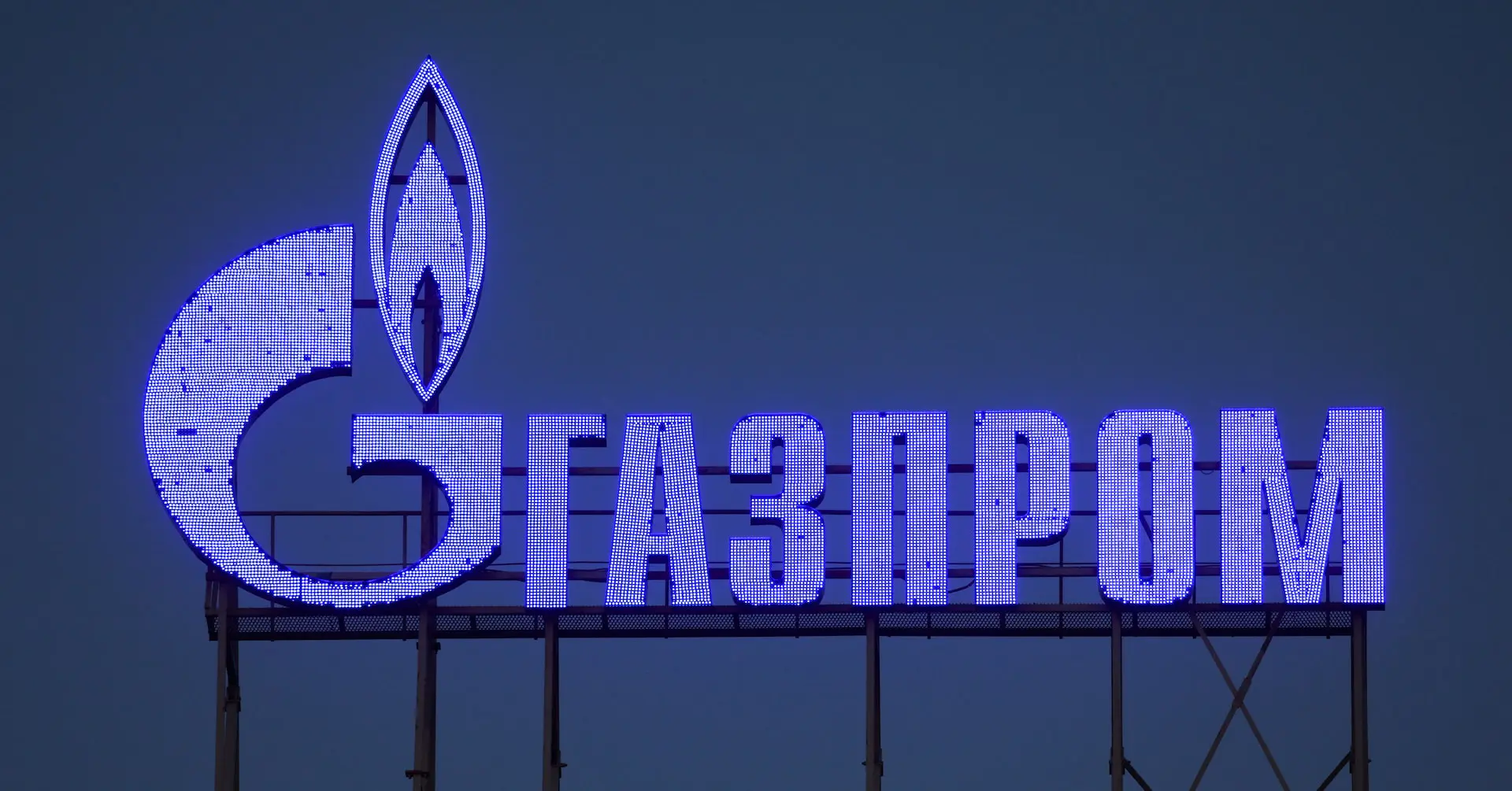
MOSCOW, Dec 31 (Reuters) - Russia’s once-dominant gas supply to Europe via Ukraine, which flowed for decades, is set to end on New Year’s Day with the collapse of a contract between the two warring countries that paid out billions to Moscow in gas revenue and to Kyiv in transit fees.
The shutdown of Russia's oldest gas route to Europe ends a decade of fraught relations sparked by Russia’s seizure of Crimea in 2014.
The European Union redoubled its efforts to reduce its dependence on Russian energy after the outbreak of the war in Ukraine in 2022 by seeking alternative sources.
Liquefied natural gas (LNG) from Qatar and United States has helped the EU find alternative supply. Piped supply has come from Norway.
The change was clear last year as Russian state-controlled gas exporter Gazprom recorded a $7 billion loss, its first since 1999, despite its efforts to boost exports to new buyer China.
The remaining buyers of Russian gas via Ukraine such as Slovakia and Austria have also arranged alternative supply.
A spokesperson for Austria's energy ministry said on Tuesday that due to purchases made via Italy and Germany and the filling of storage, supply for consumers was guaranteed.
Slovakia will also not risk a shortage, though now faces an extra 177 million euros ($184 million) in fees for alternative routes, its Economy Ministry said.
A European Commission spokeswoman said EU preparations had included energy efficiency measures, renewable energy development and a flexible gas system.
"The European gas infrastructure is flexible enough to provide gas of non-Russian origin to Central and Eastern Europe via alternative routes. It has been reinforced with significant new LNG import capacities since 2022," said Anna-Kaisa Itkonen.
Analysts foresee minimal market impact from the stoppage which was confirmed on Tuesday as data from Ukraine's gas transit operator showed Russia had not requested any gas flows for Jan. 1 through the Ukrainian pipeline to Europe as of 1700 GMT.
They say the end of the transit deal is unlikely to cause a repeat of the 2022 EU gas price rally as the remaining volumes are relatively small.
The gas market showed little reaction on Tuesday, with European benchmark gas prices ending at 48.50 euros per megawatt hour, up only marginally on the day.
Despite the EU’s progress in replacing Russian supply via Ukraine, Europe has felt the impact, with higher energy costs hitting its industrial competitiveness versus the United States and China, for example.
That has contributed to a major economic slowdown, a spike in inflation and has worsened a cost-of-living crisis.
Ukraine now faces the loss of some $800 million a year in transit fees from Russia, while Gazprom will lose close to $5 billion in gas sales.
Moldova, once part of the Soviet Union, is among the countries worst affected. It says it will now need to introduce measures to reduce its gas use by a third.
Russia and the former Soviet Union spent half a century building up a major share of the European gas market, which at its peak stood at around 35%, but the war in Ukraine has all but destroyed that business for Gazprom.
The Yamal-Europe pipeline via Belarus has also shut and the Nord Stream route across the Baltic Sea to Germany was blown up in 2022.
Combined, the various routes delivered a record high 201 billion cubic metres (bcm) of gas to Europe in 2018.
Russia shipped about 15 bcm of gas via Ukraine in 2023, down from 65 bcm when the last five-year contract began in 2020.
The only Russian gas route still operating is TurkStream which crosses the Black Sea to Turkey.
TurkStream has two lines - one for the Turkish domestic market and the other supplying central European recipients including Hungary and Serbia.
($1 = 0.9601 euros)
Ukraine ends supply of Russian gas to Europe
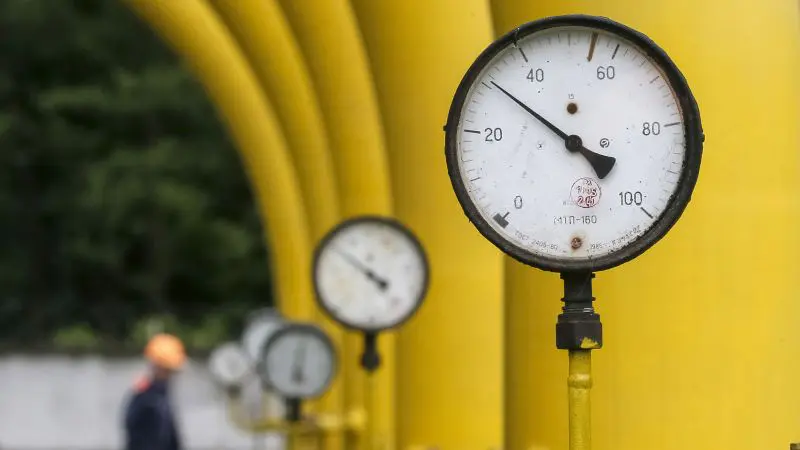
Ukraine has made good on its promise to halt the transport of Russian gas to Europe through its territory after a key deal with Moscow expired on Wednesday.
Ukraine’s refusal to renew the transit deal was an expected but symbolic move after nearly three years of its full-scale war with Russia, and comes after Europe has already drastically cut Moscow’s share of its gas imports. Ukraine’s energy ministry said it ended the deal “in the interests of national security.”
“We have stopped the transit of Russian gas. This is a historic event,” the ministry said in a statement, adding that its gas transportation infrastructure had been prepared in advance of the expiration.
Ukrainian President Volodymyr Zelensky called the move “one of Moscow’s greatest defeats.” In a Telegram post Wednesday, he accused Moscow of “turning energy into a weapon and engaging in cynical energy blackmail against its partners” and expressed hope that the United States would increase its supply of gas to Europe.
Last year, Kremlin-owned gas giant Gazprom, which signed the transit deal with Ukraine’s Naftogaz in 2019, recorded a $6.9 billion loss, its first in more than 20 years, due to diminished sales to Europe, Reuters reported. That’s despite its efforts to boost exports to new buyer China.
Ukraine now faces the loss of some $800 million a year in transit fees from Russia, while Gazprom will lose close to $5 billion in gas sales, according to the news agency. Several European countries still purchasing Russian gas had previously arranged alternative supply routes, it reported.
The lapsed deal had represented about 5% of the European Union’s total gas imports, according to Brussels-based think tank Bruegel, and supplied mainly Austria, Hungary and Slovakia. Now, after its expiry, Europe receives pipeline gas from Russia via a single route: The Turkstream pipeline, which runs through Turkey and on to Bulgaria, Serbia and Hungary, says Bruegel.
Henning Gloystein, head of Energy, Climate & Resources at Eurasia Group, said the deal’s end came as “no surprise” but expects it to trigger a jump in spot gas prices when markets reopen on Thursday.
But “a major price spike as seen during the previous Russian supply cuts is unlikely as EU importers have long prepared for this (scenario),” he told CNN, adding that most of Europe has had a mild start to winter.
The European Union has been working with countries for over a year to prepare for the possibility of the deal’s expiry, a spokeswoman for the European Commission told CNN.
“The European gas infrastructure is flexible enough to provide gas of non-Russian origin to (central and eastern Europe) via alternative routes,” the spokeswoman said. “It has been reinforced with significant new (liquefied natural gas) import capacities since 2022.”
“We did our homework and were well prepared for this scenario,” Austria’s Energy Minister Leonore Gewessler said in a statement on X early Wednesday, adding that the country’s energy firms had sought out new, non-Russian suppliers.
However, Slovakia’s Prime Minister Robert Fico said on Wednesday that the halt of Russian gas flows via Ukraine will have a “drastic” impact on the EU but not on Russia, according to a Reuters report.
Fico has previously argued that the end of the deal would lead to higher gas and electricity prices in Europe, the news agency said.
Before Russia launched its full-scale invasion of Ukraine in 2022, Russia was the European Union’s biggest supplier of natural gas. The bloc has whittled Russia’s share of its pipeline gas imports down from over 40% in 2021 to about 8% in 2023, according to the European Council.
To fill the gap, Europe has imported vast quantities of liquefied natural gas (LNG) — a chilled, liquid form of natural gas that can be transported via sea tankers — from the United States and other countries, as well as pipeline gas from Norway. The EU has also ramped up imports of Russian LNG to help heat its homes and power its factories, but faces a self-imposed deadline of 2027 and plans to break its dependence on all Russian fossil fuels.
Analysts told CNN last month that countries receiving Russian gas through the transit deal with Ukraine are not at risk of an energy shortage and would likely fill the gap by importing more LNG or more natural gas via pipeline from other European nations.
Still, Massimo Di Odoardo, a senior natural gas researcher at energy data firm Wood Mackenzie, told CNN in late December that the deal’s expiry would make it harder for Europe to refill its stores before next winter. That’s one reason why European gas prices are likely to remain close to their current levels or perhaps rise in 2025, he said.
Prices have tumbled from all-time highs reached in summer 2022 but are still more than double their historical levels.
There are already signs of strain in the region. Reuters reported on Wednesday that Transnistria, a breakaway region of Moldova, a non-EU country that also receives Russian gas via Ukraine, had cut heating and hot water supplies to households following the expiry of the transit deal.
This story has been updated with additional information and context. Juliana Liu contributed reporting.
Russia just lost a multibillion-dollar income stream
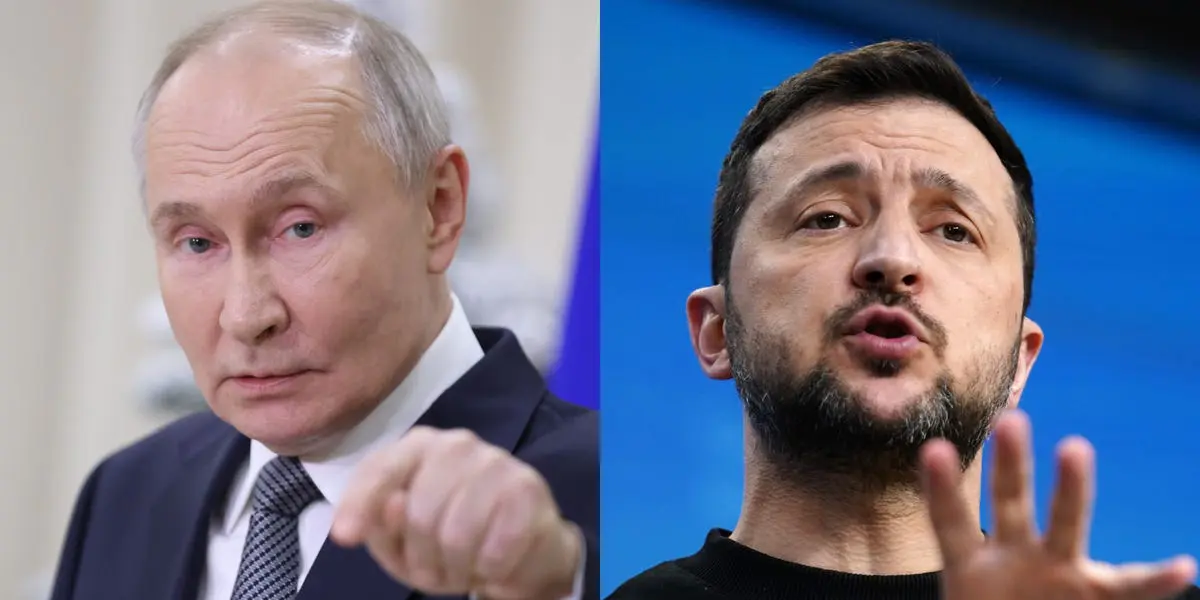
Russia is no longer able to send natural gas to Europe through Ukraine's pipelines after a five-year deal, struck before the war began, expired on Wednesday.
It marks the end of a long-standing arrangement that used Ukraine as a conduit for westbound Russian gas — an agreement that continued even as full-scale war broke out in 2022.
European countries that received that gas, such as Slovakia and Austria, were paying Russia for this energy. Reuters calculated in December that the Russian economy would earn about $5 billion in 2024 alone from piping gas through Ukraine.
The news agency also estimated that Kyiv stood to receive between $800 million to $1 billion over that year from collecting transit fees.
But Ukraine had signaled for months that it planned to let the deal expire on January 1, 2025, and it's now made good on that pledge.
"When Putin was presented with the Russian presidency more than 25 years ago, the annual gas transit through Ukraine to Europe totaled more than 130 billion cubic meters. Today, it equals 0," Ukrainian President Volodymyr Zelenskyy wrote.
Ukraine's energy minister, Herman Halushchenko, said the transit deal ceased because of national security reasons.
The Russian gas conglomerate Gazprom confirmed on Wednesday that its energy flows through Ukraine had stopped, citing "repeated and explicit refusal of the Ukrainian side to extend these agreements."
The now-defunct Ukrainian-Russian deal laid bare the complexities of the war and its political consequences in Europe, with European Union nations struggling to reduce their reliance on Russian energy even as they supplied arms to Ukraine and tried to sanction Moscow.
And as thousands died every week amid bitter fighting in Luhansk, Donetsk, Kharkiv, and Kursk, gas flowing through the same areas allowed both Kyiv and Moscow to profit off each other's goods and facilities.
Ukraine has piped Russian gas to Europe since the fall of the Soviet Union in 1991, and energy customers initially expressed concerns that they wouldn't be able to find an alternative supply in time if the deal expired.
Slovakia's prime minister, Robert Fico, criticized Kyiv's decision in a New Year's address, saying cutting off cheap Russian gas to Europe would create a "drastic impact" on EU nations but not hurt Russia.
Austria, on the other hand, cut ties with Gazprom in December, accusing Russia of blackmailing the Austrian gas company OMV by using energy as a bargaining chip over European support of Ukraine.
Losing Austria as a customer was yet another blow to Moscow's gas industry as Europe weans itself off its Russian energy supply.
The EU said in March that about 8% of its natural gas came from Russia in 2023, down from 40% in 2021.
Since the war began, the US and Norway have emerged as two of the biggest winners among natural-gas suppliers. The EU said gas purchases from the US in 2023 had tripled since 2021, filling nearly 20% of the union's gas imports.
Some countries on the continent, such as Hungary, an EU member led by a president who keeps close ties with Moscow, still have access to Russian gas through the TurkStream pipeline, which runs along the Black Sea to the Balkans.
Moldova, which isn't an EU member state, and its separatist-controlled territory, Transnistria, are expected to be hit hard by the cessation of the Ukraine-Russia deal, with the country's largest power plant historically reliant on Russian gas.
Correction: January 2, 2025 — An earlier version of this story misstated Robert Fico's title. He's the prime minister of Slovakia, not the president.
Ukraine halts flow of Russian gas to Europe
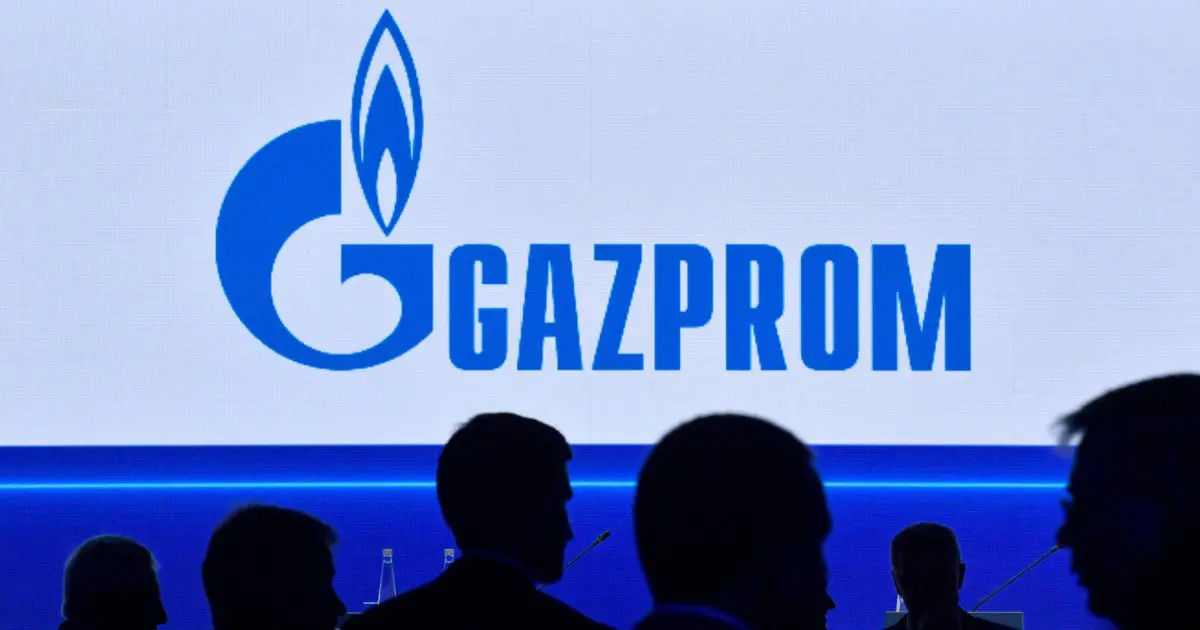
A major natural gas pipeline supplying Russian energy to Europe ran dry Wednesday after Ukraine stopped Moscow’s six-decade supply in hope of hurting its invader financially.
The planned move ends an era when many European countries kept warm using gas pumped by Russia — which was in turn accused of using that dependency to blackmail its Western neighbors after the full-scale invasion of Ukraine in 2022, which it denies.
Gazprom confirmed in a statement that the pipeline agreement had lapsed following Ukraine’s “repeated and explicit refusal to extend these agreements.”
Just as the pipeline agreement expired, Russia launched its latest salvo of drone attacks on Ukraine as Russian President Vladimir Putin seeks to build on his battlefield momentum by targeting Ukrainian civilians and energy infrastructure during its bitter winter.
Most of Russia’s 111 drones were repelled by Ukraine’s Western-backed missile defense systems, aircraft and electronic warfare technology, officials said, although at least six people were injured and two were killed in the capital, Kyiv.
“Even on New Year’s Eve, Russia was only worried about how to hurt Ukraine,” President Volodymyr Zelenskyy said early Wednesday.
Ukraine is embattled militarily, with Russian forces making front-line gains in recent months, as well as shrouded by geopolitical uncertainty. President-elect Donald Trump, who is set to enter office this month, has unnerved many in Europe by refusing to commit to the same multibillion-dollar support for Ukraine provided by the Biden administration.
As well as launching attacks into Russian territory, Ukraine is trying to hurt Moscow in other ways. Part of that is not renewing the pipeline agreement, which expired after having supplied Europe with Russian gas via Ukraine for six decades.
“We stopped the transit of Russian gas. This is a historic event,” Ukraine Energy Minister Herman Galushchenko said in a statement. “Russia is losing markets, it will suffer financial losses.”
Polish Foreign Minister Radek Sikorski said on X that the development was apt comeuppance for Putin, whom he accused of trying to "blackmail Eastern Europe with the threat of cutting off gas supplies."
The move was no surprise; Ukraine repeatedly said it would not renew the deal, which Zelenskyy said last month gave Russia “the opportunity to earn additional billions on our blood.”
But it will not be painless, with Ukraine losing up to $1 billion a year in transit fees it charged Russia to use its pipeline, Reuters reported. That’s less than the $5 billion Gazprom, Russia’s state-owned energy giant, is set to lose annually, according to the news agency.
Gazprom confirmed in a statement Wednesday that the pipeline agreement had lapsed following "repeated and explicit refusal to extend these agreements" by Ukraine.
Most European countries no longer depend on Russian gas, having diversified their supplies — to the United States, Qatar and others — after Putin’s full-scale invasion of Ukraine in February 2022. Nevertheless, halting the pipeline sent European Union natural gas prices rising to 50 euros ($52), their highest since the 330-euro spike in 2022 after the invasion.
Turning off the taps may also affect Austria, Slovakia and particularly Moldova — which is not part of the E.U. — all of whom rely on Russian gas more than most in Europe. Already in the Moldovan breakaway region of Transdniestria, home to 450,00 people and 1,500 Russian troops, the local energy company cut off domestic hot water and heating supplies Wednesday, Reuters said.
Not only is Russia's Ukrainian natural gas artery down, but the Nord Stream gas pipelines also remain damaged by as-yet unexplained explosions in September 2022. That leaves only the TurkStream pipeline linking Russia with Turkey, Hungary and Serbia.
CORRECTION (Jan. 2, 2025, 7 p.m. ET): A previous version of this article misstated when Ukrainian President Volodymyr Zelenskyy said the pipeline deal gave Russia “the opportunity to earn additional billions on our blood.” It was last month, not earlier this month.
Moldova breakaway region faces extended blackouts after gas cutoff
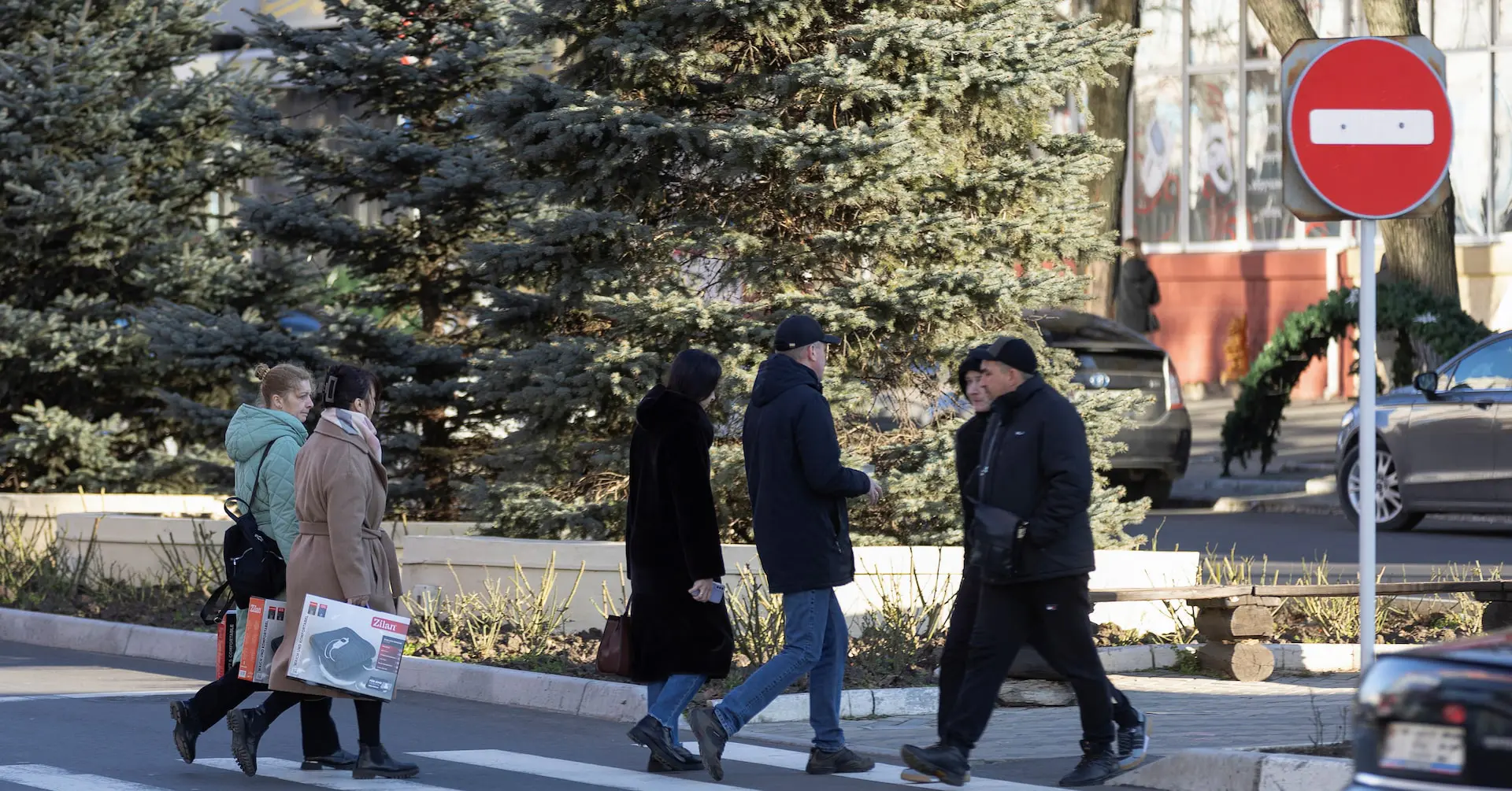
KYIV, Jan 4 (Reuters) - The pro-Russian breakaway Moldovan region of Transdniestria, left without Russian gas supplies no longer transiting through neighbouring Ukraine, faced longer periods of rolling power cuts on Saturday, local authorities said.
Flows of Russian gas via Ukraine to central and eastern Europe stopped on New Year's Day after a transit deal expired between the warring countries and Kyiv refused to extend it.
Transdniestria, a mainly Russian-speaking enclave which has lived side-by-side with Moldova since breaking away from it in the last days of Soviet rule, received gas from Russian giant Gazprom (GAZP.MM) , opens new tab through the pipeline crossing Ukraine.
The gas was used to operate a thermal plant which provided electricity locally and for much of Moldova under the control of the pro-European central government.
The region's self-styled president, Vadim Krasnoselsky, writing on the Telegram messaging app, said rolling power cuts in various districts would be extended to four hours on Sunday.
Hour-long cuts were first imposed on Friday evening after heating and hot water supplies were curtailed. The cuts were then extended to three hours on Saturday.
"Yesterday's introduction of rolling cuts was a test. And it confirmed that an hour-long break to keep the electrical supply system operating was insufficient," Krasnoselsky wrote. "The power generated is not covering sharply rising demand."
All industries except those producing food have been shut down. The official Telegram news channel of the region's separatist authorities announced the official closure on Saturday of a steel mill and bakery in the town of Rybnitsa.
Regional officials announced new measures to help residents, especially the elderly, and warned that overnight temperatures would fall to -10 Celsius (+14 Fahrenheit). Residents were told not to put strain on the region's mobile phone network.
The news channel warned against using heaters in disrepair after two residents died of carbon monoxide poisoning from a stove. Online pictures showed servicemen loading up trucks with firewood for distribution.
"Don't put off gathering in firewood," Krasnoselsky told residents. "It is better to ensure your supply in advance, especially since the weather is favorable so far."
Moldova's government blames Russia for the crisis and has called on Gazprom to ship gas through the Turkstream pipeline and then through Bulgaria and Romania.
Russia denies using gas as a weapon to coerce Moldova, and blames Kyiv for refusing to renew the gas transit deal.
The Transdniestria power cuts are a problem for Moldova particularly because the enclave is home to a power plant which provides most of the power for government-controlled areas of Moldova at a fixed and low price.
Prime Minister Dorin Recean said on Friday his country faced a security crisis after Transdniestria imposed the rolling blackouts, but he also said the Chisinau government had prepared alternative arrangements, with a mixture of domestic production and electricity imports from Romania.
Even before the halt of supplies via Ukraine, Gazprom had said it would suspend exports to Moldova on Jan. 1 because of what Russia says are unpaid Moldovan debts of $709 million. Moldova disputes that and put the figure at $8.6 million.
Ukraine's halt of Russian gas to Europe throws breakaway Moldovan region into crisis mode
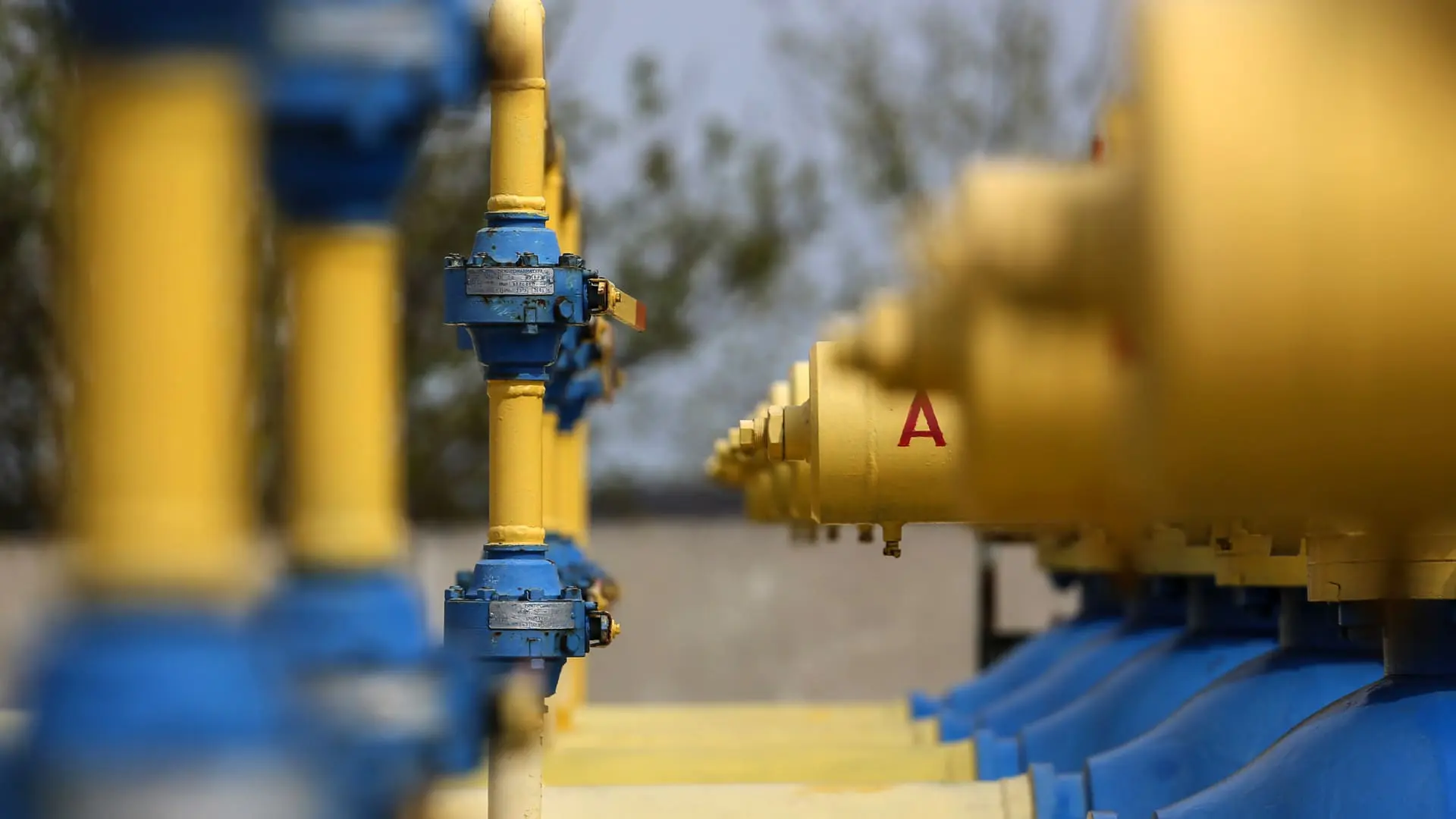
Moldova's breakaway region of Transnistria has been thrust into a profound energy crisis following the termination of a five-year gas transit agreement between Russia and Ukraine.
Hundreds of thousands of people in the mainly Russian-speaking territory of Transnistria are left facing the remaining winter months without heating or power after Ukraine halted the flow of Russian gas to several European countries on New Year's Day.
The widely expected stoppage, which was confirmed by Russia's state-owned energy giant Gazprom on Wednesday, marked an end to Moscow's decades-long dominance over Europe's energy markets.
Alongside Slovakia and Austria, Moldova was thought to be one of the countries most at risk from the cessation of Russian gas supplies.
Sandwiched between Romania and Ukraine, the landlocked Eastern European country declared a 60-day state of emergency last month over energy security fears.
Transnistria, a separatist pro-Russian enclave in Moldova, broke away in the early 1990s after the Soviet Union collapsed, although it is still internationally recognized as part of Moldova.
The region has now been forced to close almost all industrial companies, with the exception of food producers, following Wednesday's cutoff of Russian gas supplies.
"All industrial enterprises are idle, with the exception of those engaged in food production — that is, directly ensuring food security for Transdniestria," Sergei Obolonik, first deputy prime minister of the region, told a local news channel on Thursday, according to Reuters.
"It is too early to judge how the situation will develop. ... The problem is so extensive that if it is not resolved for a long time, we will already have irreversible changes — that is, enterprises will lose their ability to start up."
Until Wednesday, Russian gas had reached Moldova via its neighbor of Ukraine. However, neither Moscow nor Kyiv had been willing to strike a new gas transit deal amid the ongoing war.
Russia, which has transported gas to Europe via Ukrainian pipelines since 1991, has claimed European Union countries will suffer the most from the supply shift. Moscow can still send gas via the TurkStream pipeline, which links Russia with Hungary, Serbia and Turkey.
The European Commission, the EU's executive arm, said it has been working with EU member states most impacted by the end of the gas transit agreement to ensure the entire 27-nation bloc was prepared for such a scenario.
Moldova, which is not an EU member state but narrowly voted in favor of closer EU ties in a referendum last year, is now facing a significant gas shortage.
In Transnistria, the breakaway region's leader, Vadim Krasnoselsky, said via Telegram on Thursday that the situation "is difficult, but social collapse is unacceptable."
Krasnoselsky said more than 2,600 facilities in the region were currently without heat and hot water, of which over 1,500 were apartment buildings.
Krasnoselsky said Wednesday that Transnistria's main power plant had started using coal after the stoppage of Russian gas supplies and estimated that the enclave had enough gas reserves to last for 10 days of limited usage in its northern parts and twice as long in the south.
"In Transnistria, the year began with a serious test – an energy crisis provoked by an unfavorable combination of external factors," Krasnoselsky said, according to a translation.
Moldova Prime Minister Dorin Recean said Friday that the country faces a security crisis after the stoppage of Russian gas flows via Ukraine and accused the Kremlin of "gas blackmail."
In a statement on the government's website, Recean warned of an impending humanitarian crisis for the 350,000 residents of the Transnistrian region.
"By jeopardising the future of the protectorate it has backed for three decades in an effort to destabilise Moldova, Russia is revealing the inevitable outcome for all its allies – betrayal and isolation," Recean said.
"We treat this as a security crisis aimed at enabling the return of pro-Russian forces to power in Moldova and weaponising our territory against Ukraine, with whom we share a 1,200 km border," he added.
A spokesperson at the Russian Embassy in London was not immediately available to comment when contacted by CNBC.
Moldova's prime minister said the country had managed to secure its electricity supply in the first days of 2025, with half of the country's energy consumption covered by domestic sources and the other half coming from imports.
The country's parliament said late last year that the stoppage of Russian gas to its Transnistrian region could generate "a humanitarian crisis" as well as "risks to the functioning and stability" of the Moldova's energy sector.
Moldova is scheduled to hold parliamentary elections over the coming months. The vote is poised to shape the country's future relationship with the EU.
In early November last year, European leaders congratulated pro-Western incumbent Maia Sandu on winning a runoff vote in the country's presidential election. The ballot was seen as a further step on the former Soviet republic's road to integration with the bloc.
— CNBC's Holly Ellyatt contributed to this report.
Moldovan PM warns of security crisis after cut-off of Russian gas
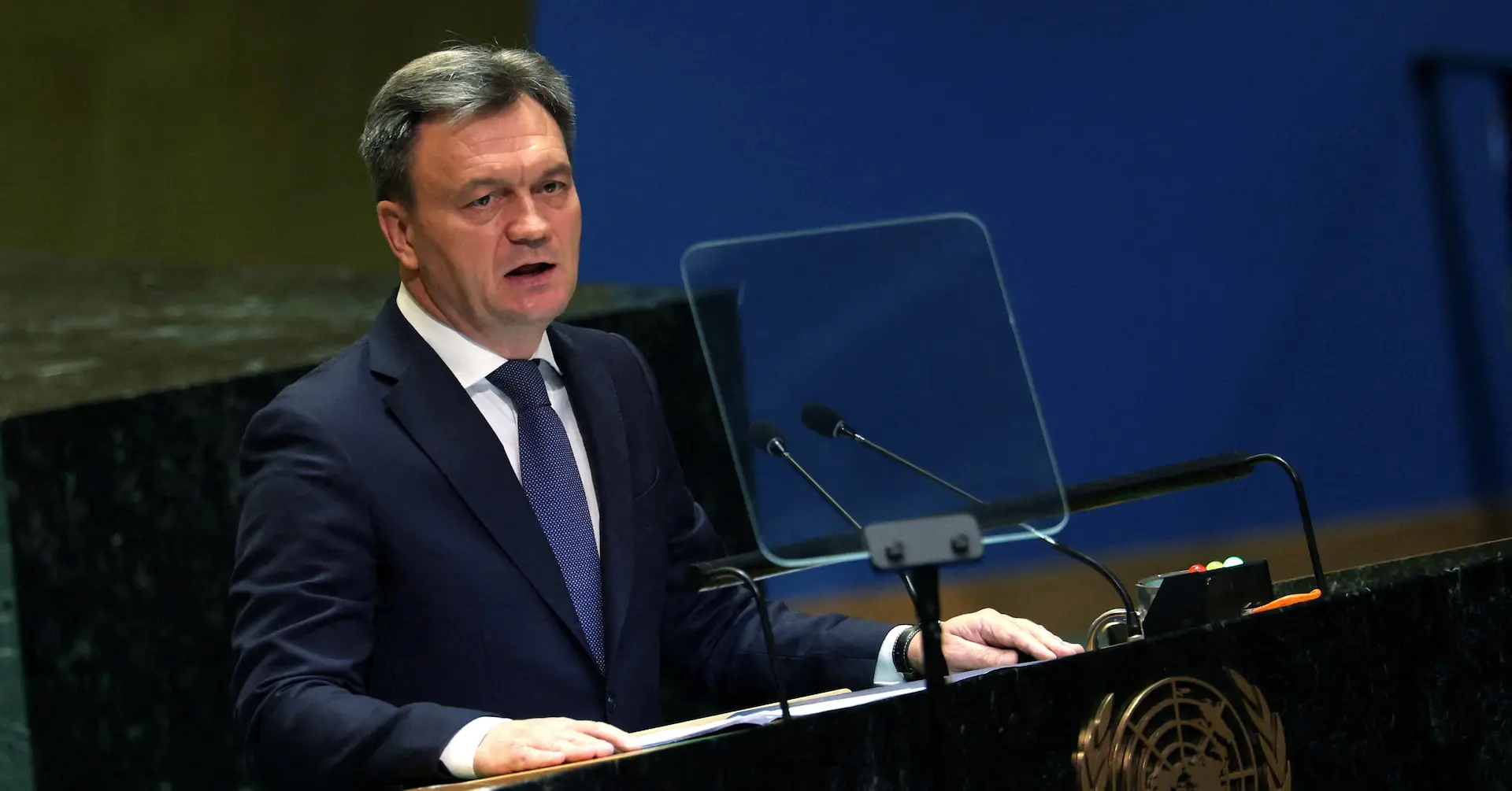
KYIV, Jan 3 (Reuters) - Moldova faces a security crisis, Prime Minister Dorin Recean said on Friday after its separatist pro-Moscow Transdniestria region, cut off from supplies of Russian gas, closed factories, restricted central heating and imposed rolling power blackouts.
Flows of Russian gas via Ukraine to central and eastern Europe were halted on New Year's Day after a transit agreement between the warring countries expired, and Kyiv rejected doing further business with Moscow.
Recean said government-controlled Moldova would cover its own energy needs with domestic production and imports but noted the separatist Transdniestria region had suffered a painful hit despite its ties with Moscow.
"By jeopardising the future of the protectorate it has backed for three decades in an effort to destabilise Moldova, Russia is revealing the inevitable outcome for all its allies – betrayal and isolation," Recean said in a statement.
"We treat this as a security crisis aimed at enabling the return of pro-Russian forces to power in Moldova and weaponising our territory against Ukraine, with whom we share a 1,200 km (745-mile) border."
The official Telegram news channel of separatist Transdniestria said rolling power cuts had gone into effect on Friday evening. It listed districts where power would be cut for an hour or more between 6 p.m. and 10 p.m.
"As the Ministry of Economic Development notes, this is in connection with the fact that residents at this time are consuming more power than the system can generate," the channel said.
The news channel said a sanatorium, fully heated and with hot water, was sheltering orphans and residents of nursing homes. It accused Moldova's central government of failing to understand or tackle the difficulties facing the region.
"Moldovan authorities are completely out of touch with reality and continue to talk about 'the price of freedom from Russian gas,'" the channel said.
Transdniestria's residents had already lost hot water and
central heating, and all factories except food producers have
been forced to stop production.
The enclave's self-styled president, Vadim Krasnoselsky, had earlier said power cuts were inevitable. He said the region had gas reserves to cover 10 days of limited usage in the north and twice as long in the south
Russia denies using gas as a weapon to coerce Moldova, and blames Kyiv for refusing to renew the gas transit deal.
Russian gas giant Gazprom (GAZP.MM) , opens new tab had separately said on Dec. 28 that it would suspend exports to Moldova on Jan. 1 because of what Russia says are unpaid Moldovan debts of $709 million. Moldova disputes that, and has put the figure at $8.6 million.
The southeast European nation of about 2.5 million people has been in the spotlight since Russia's invasion of neighbouring Ukraine at a time of mounting tensions between Moscow and the West.
Its pro-European President Maia Sandu won a second term in an election last year and has pledged to accelerate reform and consolidate democratisation.
Moldova plans to hold a parliamentary election this summer.
Mainly Russian-speaking Transdniestria, which split from Moldova in the 1990s, received Russian gas via Ukraine.
In turn, Moldova used to receive the bulk of its electricity from Transdniestria. But, with Kyiv making clear it would stop gas transit from Russia, the Chisinau government prepared alternative arrangements, with a mixture of domestic production and electricity imports from Romania, Recean said.
He said the Moldovan government remained committed to helping the enclave.
"Alternative energy solutions, such as biomass systems, generators, humanitarian aid, and essential medical supplies, are ready for delivery should the breakaway leadership accept the support," the government said in a statement.
The head of Moldova's national gas company Moldovagaz, Vadim Ceban, said Transdniestrian authorities had turned down an offer to help purchase gas from European countries because the enclave believes Russian gas supplies could still be resumed.
Such purchases would be more costly. Gazprom has long supplied gas to the region without demanding payment.
A European region shut down swathes of its economy after Russian gas stopped flowing from Ukraine
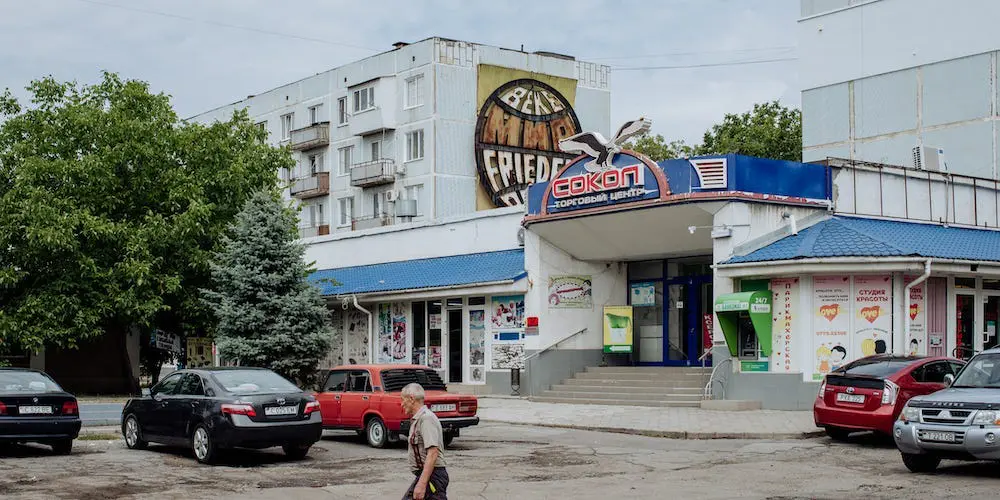
A breakaway region of Europe has been forced to halt almost all industrial production after Ukraine ended the transit of Russian gas through its territory.
"All industrial enterprises are idle, with the exception of those engaged in food production — that is, directly ensuring food security," Transnistria's first deputy prime minister, Sergei Obolonik, said, per Reuters.
Obolonik said it was "too early" to say what will unfold, but the region risks "irreversible" changes if the problem isn't quickly resolved.
"Enterprises will lose their ability to start up," he added.
Transnistria, an autonomous region that broke off from Moldova in the 1990s, has been one of the hardest-hit following Ukraine's decision not to renew a gas transit agreement with Russia on January 1.
The pipeline's shutdown marked the end of an era for Russia's oldest gas route to Europe.
Almost a hundred large- and medium-sized industrial enterprises operate in Transnistria, according to its chamber of commerce.
The region is pro-Russia and is largely Russian-speaking. It hosts about 1,500 Russian soldiers, ostensibly on national security grounds.
In December, its government said that it was "making every possible effort to maintain natural gas supplies" in the face of the Ukrainian decision, and blamed Moldova for not taking joint steps to ensure the supply.
But on Monday, local energy company Tirasteploenergo warned that it would cut heating and hot water to homes starting January 1, reserving supplies for hospitals.
The company advised families to seal drafts and gather in a single room to save heat.
It suggested sealing cracks in windows and balcony doors, hanging blankets over them, and putting all family members in one room, warning that temperatures could drop to 23 degrees Fahrenheit in the capital, Tiraspol.
Some towns have set up "heating points" and local authorities are offering hotlines to help people find firewood, the BBC reported.
The region's leader, Vadim Krasnoselsky, has said that it has up to 20 days of gas reserves, and that energy production has switched from gas to coal, according to Reuters.
He added that there should be electricity for households through January and February.
Ahead of Russia's full-scale invasion of Ukraine in 2022, Europe sourced around 40% of its gas from Russia. But the war sparked an unprecedented resolve to reduce countries' dependence on Russian energy.
Many have cut their reliance and found alternative, often more expensive, sources of gas.
The loss of Russian gas will badly impact Transnistria's economy, since the region has been getting gas basically free of charge from Russian state-owned giant Gazprom.
Moldova, an EU candidate country, could also be badly hit, as it gets 80% of its energy from a power plant in Transnistria. It faces a major hike in energy costs amid plans to switch sources, the BBC reported.
Other European nations could also be badly impacted, and Slovak Prime Minister Robert Fico has appealed to the EU to find a way to keep Russian gas flowing via Ukraine.
"Halting gas transit via Ukraine will have a drastic impact on us all in the EU — but not on the Russian Federation," Fico said in a New Year's address.
Thousands without heating in Moldova’s breakaway Transnistria region, after Russian gas supplies cut
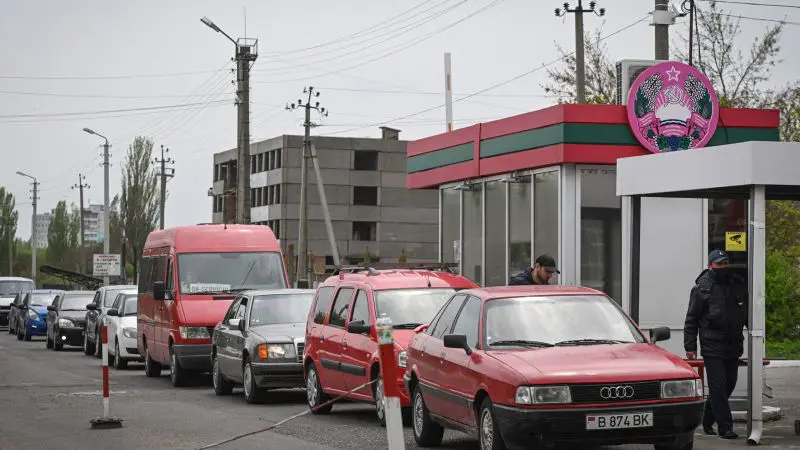
The head of Moldova’s breakaway region Transnistria has urged residents to burn firewood for heating and warned that blackouts cannot be avoided, after Moscow stopped supplying gas via Ukraine.
Vadim Krasnoselskyi, the president of the Russian-backed separatist sliver on Moldova’s eastern flank, said in a message on Telegram on Friday that “1,500 multi-story apartment buildings have no heating and hot water. Almost 72,000 private households have no gas. One hundred and fifty gas boiler houses have been shut down.”
“Fortunately, our region is rich in wood. There are still reserves,” he added, encouraging residents in rural areas with active stoves to find and burn woodwhere possible.
The region has been plunged into an energy crisis since New Year’s Day, when Ukraine made good on its promise to halt the transport of Russian gas to Europe through its territory after a key deal with Moscow expired. Ukrainian President Volodymyr Zelensky hailed the move as “one of Moscow’s greatest defeats.”
Transnistria – a pro-Russian breakaway territory on the Ukrainian border – split from the rest of Moldova after the fall of the Soviet Union in 1991. It had been receiving Russian gas via Ukraine until the supply was cut off.
“We cannot avoid rolling blackouts. This is required to protect the system. I am sure that everyone is accepting this stage with understanding,” Krasnoselskyi wrote on Telegram on Friday. “The government has developed a schedule, based on which it will be possible to organize everyday life and activity with the least inconvenience.”
Temperatures in the Transnistrian capital Tiraspol were forecast to hover slightly above freezing over the weekend, as a cold snap passes through much of Europe, though the European winter has otherwise been relatively mild so far.
The breakaway region’s parliament urged the Kremlin to reach a new deal with Ukraine over gas last month. Before the expiry of the transit deal with Ukraine, Russia had been supplying Moldova with around 2 billion cubic meters of gas per year, which was pumped through Transnistria, according to Reuters.
Ukraine now faces a loss of some $800 million a year in transit fees from Russia, while Kremlin-owned gas giant Gazprom will lose close to $5 billion in gas sales, the news agency reported.
Slovakian Prime Minister Robert Fico has meanwhile suggested he could cut electricity supplies to Ukraine and reduce aid to Ukrainian refugees in retaliation for the expiry of the gas transit deal, which he described as “sabotage” by Zelensky.
Europe has in general significantly reduced its reliance on Russian energy since Moscow’s invasion of Ukraine in February 2022, but parts of the former Eastern Bloc still import gas in large quantities.
